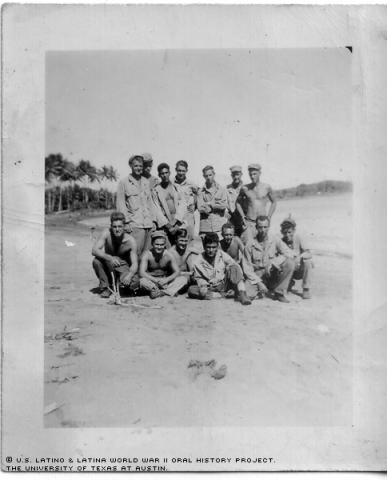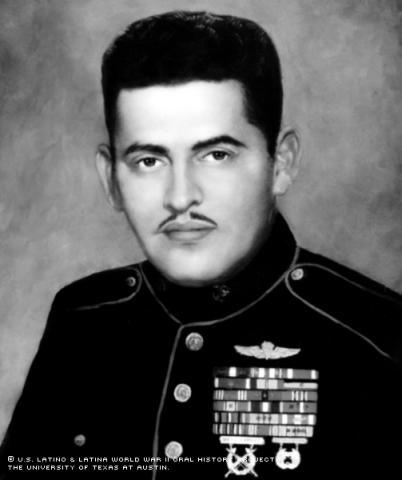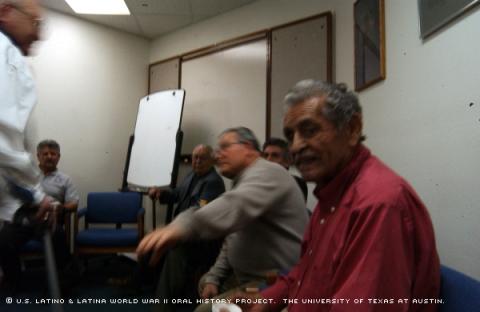


By Darcy Keller
As a prisoner of war, Private Joe M. Ruiz narrowly escaped death at the end of World War II.
After a failed mission and a surprise encounter with the Japanese, Ruiz, who served with the 389th Coast Artillery Battalion of the 6th Army, was captured and taken to Kobe, Japan. As a prisoner, he endured beatings and starvation until the Red Cross rescued him after the war ended with the bombing of Nagasaki.
"It saved my life when they dropped those bombs in Nagasaki," Ruiz said. "When [the] Red Cross got me out, I was more dead than alive. I was 104 pounds."
Following the rescue, he was transferred to a hospital in the Philippines’ Manila, where he underwent reconstructive surgery on his face to repair a broken jaw, damaged eye and multiple scars inflicted by his Japanese captors.
This brush with death was the last Ruiz would experience in WWII, but it wasn't his first.
His first encounter with danger came on an earlier stay in the Dutch East Indies, where he was stationed with the Army.
Hunger led Ruiz and a friend on a search for bananas and coconuts that left them lost behind enemy lines. Luck was on their side when natives found them before the enemy did. As Ruiz tried to extend a friendly greeting, they looked puzzled.
"They saw that I was brown like them," Ruiz said. "We told them that we were hungry, and they climbed up into the tree and chopped the coconuts."
The two soldiers drank the coconut milk and explained their situation to the natives, who helped them return to U.S. territory, escaping capture.
To make it past the Japanese undetected, Ruiz and his comrade hid under blankets on the natives' cargo boat. As they passed the enemy checkpoint, Japanese soldiers slashed through the materials Ruiz and his friend were hiding under, to ensure the natives weren't harboring American soldiers.
The two made it successfully through the checkpoint, although his friend suffered a superficial wound on the side of his torso.
A younger Ruiz was living in Tempe, Ariz., when he heard the news of the bombing at Pearl Harbor.
"I remember I was at a matinee movie with my girlfriend, and they got on stage to tell us that Pearl Harbor had been bombed," Ruiz said. "I was so scared. When I was by myself, I would cry about it."
Two weeks later, he enlisted in the Marine Corps. He was accepted but told he’d have to wait at least two weeks for the next train to fill up before departing for training in San Diego.
"I don't know why, but I wanted to go," he said. "I asked if it was too late for me to go into the Army."
Ruiz was told that if accepted by the Army, he could be released from the Marine Corps. Eager to get involved immediately, he enlisted in the Army in 1942 and shipped out the next day. By then he was 17, barely an adult.
Growing up, Ruiz says he enjoyed a close relationship with his mother and father.
His most vivid memories with his father are of bi-weekly social outings with friends.
"Everywhere he went, I would go," he said. "I would sit in the car."
His family's strong bond sustained them through difficult times of poverty and discrimination. Working every summer while in school, Ruiz gave his earnings back to the family, never keeping any for himself.
"My father worked at the railroad three days a week for less than a dollar a day," Ruiz said.
Ruiz says he learned the importance of community service during his childhood by witnessing his father's generosity. With the little money his father made, he still tried to help other families in need.
"We never went hungry," he said. "He kept us fed."
After his Army service, Ruiz returned home and got his high school diploma. He went on to Arizona State University using the GI Bill, but fell nine credit hours short of his degree. His plans to complete his education were rerouted when Motorola recruited him. He moved to California and worked as an engineer for the company for several years before returning to military service in 1953.
Ruiz entered the Marine Corps near the end of the Korean War. In 1954 and 1955 he was stationed in the Dominican Republic and Lebanon. Those assignments were peaceful. But beginning in 1964, he began three tours in Vietnam and saw combat. He was also struggling with alcoholism as he tried to sort through painful memories of years at war that he’d long suppressed. His drinking problem was at its worst, he says, in Okinawa, as he awaited a transfer flight to Vietnam.
"I was on my way to Vietnam -- on my last tour," Ruiz said.
That night he met a friend returning from Vietnam, and they went out for drinks. He planned on drinking coffee but gave in to one beer that led to a four-day binge.
"One beer was all it took," Ruiz said.
He ran out of money and went to the military office to request more. When a lieutenant there began to hassle him, the situation escalated.
"I said, 'Are you threatening me?' and he said, 'No,'" Ruiz said. "Then I threw him through a window. When you hit an officer, you're out of the Marine Corps. I was court-martialed and they held me there for 30 days."
When Ruiz was found guilty of missing flights and disrespect to an officer, he was sure he’d seen the end of his military service.
"They gave me my tenure, and I thought I was going to be sent home," he said.
Instead, the military sent a letter of reprimand to the Marine and fined him $150 for three months. He credits the leniency he received to the dedication of a Marine Corps lawyer -- a woman and captain -- who volunteered to work on his case.
When the trial concluded, Ruiz was sent immediately to Vietnam, landing in the middle of a New Year's Eve celebration as the soldiers ceremoniously fired their weapons.
Ruiz was able to overcome his earlier problems and proved to be a hero in Vietnam. His honors included Silver Stars, a Navy Cross and a Purple Heart. But Ruiz remains haunted by his memories of war. He suffers from post-traumatic stress disorder and has difficulty detailing his military involvement.
"The littlest thing triggers a memory," he said. "You never forget. At least I'm not having dreams now as much as I used to. But they'll come back. The other day, I was watching [the TV show] 'Jag,' and I knew it would trigger a nightmare. But my nightmares are not as bad as they used to be. I used to jump out of bed and scream."
Ruiz says he wants to forget the dark side of war. He requested he not be asked to be specific about his medals and service; the memories are too painful.
"Even books and movies trigger it many times," he said. "It seems like my story."
Ruiz says he wants to live in the present and invest in the future by occupying most of his time caring for his grandchildren at his home in Tempe. His advice to younger generations of Latinos emphasizes the supreme importance of an education.
"Most important is education," Ruiz said. "Also, stay away from drugs and listen to the advice of your parents."
Mr. Ruiz was interviewed in Phoenix, Arizona, on January 4, 2003, by Delia Esparza.

